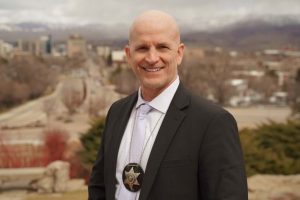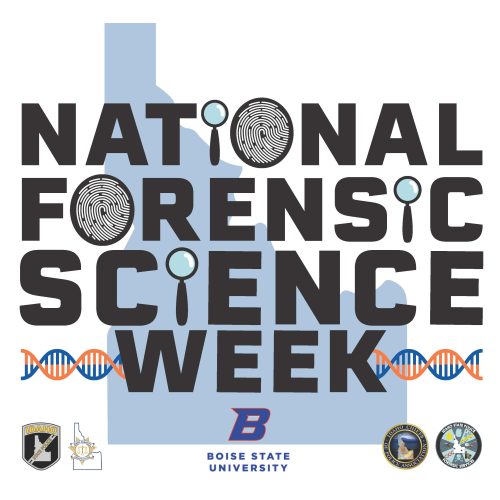
- 2025 Proclamation.pdf
- 2024 Proclamation.pdf
- 2023 Proclamation.pdf
- 2022 Proclamation.pdf
- 2021 Proclamation.pdf
- Since 2008, Matthew Gamette has spearheaded the advancements in the ISP lab system:
- Procured new technology, streamlined processes, added additional services and programs, and participated in numerous improvement projects.
- Projects successes better serve the State of Idaho to provide justice and closure to victims and their families.
- Standout projects:
- Advocated at the supreme court for virtual testimony
- Saves taxpayer money by reducing expenses associated with travel
- Assisting in implementing a different extraction process and validation in toxicology
- Secured funding for a National Integrated Ballistic Information Network (NIBIN) unit in Meridian & Coeur D’Alene.
- Secured grant funding for a 3D imaging system in firearms
- Collaborated with Health and Welfare to get additional instruments in toxicology
- Implemented a process for rapid screening of overdose death samples through grant funded partnership with Health and Welfare
- Secured $5.2M in federal funding to bring a first of its kind statewide cold case team to Idaho including:
- Investigators, an internal genealogist, and crime and data analysts, and
- The project encompasses a team to identify those who lawfully owed DNA to the State of Idaho DNA database.
- Collaborated with Washington State Police (WSP) to assist ISPFS in getting training so fire debris analysis is performed.
- Solicited contractors to offer document examination services and trained an ISPFS analyst in this discipline.
- Advocated at the supreme court for virtual testimony
- Matthew’s contribution to forensic science goes beyond Idaho by serving on various committees, professional organizations, or volunteering on various panels: such as
- Serving on the American Society of Crime lab Directors board from 2013-2018 and board president from 2018-2019,
- Serving as the committee chair and chair of the Consortium of Forensic Science Organizations since 2015
- Founding and chairing the National and Technology Validation and Implementation Collaborative,
- Volunteered as a quality assurance expert on the National Institute of Standards and Technology Organization of Scientific Area Committees,
- Served on the FBI National DNA Index System (NDIS) review panel,
- After Hurricane Maria, Matthew led efforts to support the Puerto Rico forensic laboratory, assisting them with securing instrumentation and training,
- Always pushes to improve and advance the services provided in the forensic science industry,
- A compassionate leader who works to develop the technical skills of the staff in the forensic lab as well as their leadership and mentorship skills,
- Supports and encourages participation of the staff in forensic organizations and committees promoting interagency collaboration, and
- Strives to hire talented staff and gives them the tools to improve and perform their jobs and better serve the people of Idaho and beyond.
Past National Forensic Science Week Presenters
Sergeant Clinton Wagner has worked in law enforcement for 20 years. He began his career in 2005 with the Jerome County Sheriff’s Office, where he initially worked in the jail before moving over to patrol. In 2012, Sgt. Wager transferred to the Jerome Police Department where he worked as a patrol officer, and eventually promoting to Sergeant. In 2022, Sgt. Wagner was promoted to Detective Sergeant and began supervising the investigations unit. He currently oversees Investigations, all of the School Resource Officers, Property, and Evidence.

ISPFS DNA Supervisor Katie White began her forensic science career in 2008 as a Forensic Biologist with the Denver Police Department. In 2012, Katie worked as a DNA Technician for Ideal Innovations Inc., before moving to Texas to work for the Texas Department of Public Safety as a Forensic Scientist III in 2014. Katie has been with the Idaho State Police since 2016 and currently serves as a Forensic Scientist III/Supervisor for the Biology Unit, the State CODIS Administrator, is a member of the Idaho Cold Case Advanced DNA Methods Working Group, and is the Designated Laboratory Official for the ISP Sexual Assault Kit Initiative (SAKI) Group.

Solving a Cold Case Homicide in Canyon County Idaho using Whole Genome Sequencing
Finding Justice for a victim of abduction, rape, and murder
This presentation will provide case overview of the murder of Daralyn Johnson. She was only 9 years old in February of 1982 as she was walking to school when she was abducted and eventually raped and murdered. Her body was later dumped near a river that was 18 miles away.
The case involved the use of scientific examinations in 1982, which at the time did not employ the use of DNA. Charles Fain was wrongfully convicted in 1983 of this murder and served 18 years on Idaho’s death row. Through the diligence of attorneys working on his case, along with attorneys working for the attorney general’s office, he was eventually cleared of the murder in 2001 by use of mitochondrial DNA testing.
The case remained a cold case until 2020, when Dr. Edward Green from the University of California Santa Cruz, was asked to perform testing on rootless hairs that were recovered from the victim at the original crime scene. This case was the first forensic investigative genetic genealogy case to be successfully tried in the state of Idaho.
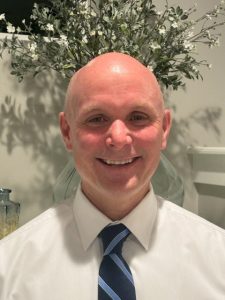 Ted Lagerwall has been a career prosecutor for over 25 years. He is currently an assistant prosecuting attorney in Canyon County, Idaho, where he has worked since he and his family moved to the Boise area in the summer of 2022. His previous experience entailed working as an assistant state’s attorney for the Cook County State’s Attorney’s Office in Chicago, Illinois for over 24 years, where he held various positions. The vast majority of his time as a prosecutor was prosecuting murder cases in the Gang and Cold Case Homicide Unit in Chicago and southern suburbs of the city. Ted has also been a public speaker, conducting numerous trainings in various aspects of trial work.
Ted Lagerwall has been a career prosecutor for over 25 years. He is currently an assistant prosecuting attorney in Canyon County, Idaho, where he has worked since he and his family moved to the Boise area in the summer of 2022. His previous experience entailed working as an assistant state’s attorney for the Cook County State’s Attorney’s Office in Chicago, Illinois for over 24 years, where he held various positions. The vast majority of his time as a prosecutor was prosecuting murder cases in the Gang and Cold Case Homicide Unit in Chicago and southern suburbs of the city. Ted has also been a public speaker, conducting numerous trainings in various aspects of trial work.
Soon after arriving at the Canyon County Prosecuting Attorney’s Office, Ted Lagerwall became the lead prosecutor in the Daralyn Johnson case.
Detective Paul Jagosh, Boise Police Department Violent Crimes Unit, has over 25 years of experience in law enforcement with assignments in patrol, special weapons and tactics, use of force instructor, and he is currently a Violent Crimes Detective. His caseload consists of homicides, robberies, aggravated assaults and batteries, kidnappings, cold cases, and officer-involved shootings. Detective Jagosh wrote the curriculum and instructs for the Boise Police New Detective Academy. Detective Jagosh graduated from Northwest Nazarene University with a B.A. in Political/Social Science. Most recently, Detective Jagosh was the lead Detective involved in helping solve the 1987 Joyce Casper cold case murder.
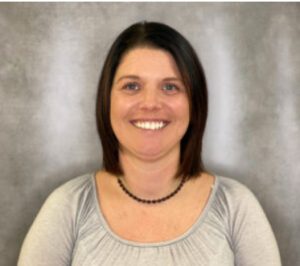
Britany Wylie is the Firearms Discipline Leader of the Idaho State Police Forensic Services Laboratory. She joined ISPFS in 2011, working in Urine Toxicology, while training in Firearms and Toolmark Analysis. She completed her Firearm and Toolmark training in 2018 and continues working casework in Toxicology and Firearms & Toolmarks.
 Brett Harding began his career in Medicolegal Death Investigation in 1988 and now serves as the Chief Deputy Coroner with the Ada County Coroner’s Office in Boise, Idaho. Mr. Harding is a Fellow of the American Academy of Forensic Sciences, the American Board of Medicolegal Death Investigators, and the International Association of Coroners and Medical Examiners. He is an Affiliate member of the National Association of Medical Examiners and serves on the board of directors for the National Association of Homicide Investigators. Mr. Harding is also a consultant on psychological autopsy investigations and is one of only twenty-five certified psychological autopsy investigators in the United States.
Brett Harding began his career in Medicolegal Death Investigation in 1988 and now serves as the Chief Deputy Coroner with the Ada County Coroner’s Office in Boise, Idaho. Mr. Harding is a Fellow of the American Academy of Forensic Sciences, the American Board of Medicolegal Death Investigators, and the International Association of Coroners and Medical Examiners. He is an Affiliate member of the National Association of Medical Examiners and serves on the board of directors for the National Association of Homicide Investigators. Mr. Harding is also a consultant on psychological autopsy investigations and is one of only twenty-five certified psychological autopsy investigators in the United States.
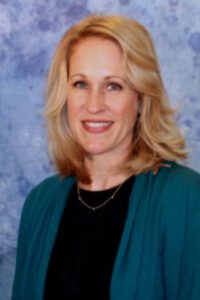 Rylene Nowlin is the Laboratory Manager of the Idaho State Police Forensic Services Laboratory in Meridian, Idaho. She joined the ISPFS biology/DNA casework/DNA database unit in 2002 and was a full-time casework analyst until her promotion to Laboratory Manager in 2014. She continues to perform DNA casework in that unit. Rylene is an Idaho native who enjoys volunteering with local 4-H groups and showing painted horses.
Rylene Nowlin is the Laboratory Manager of the Idaho State Police Forensic Services Laboratory in Meridian, Idaho. She joined the ISPFS biology/DNA casework/DNA database unit in 2002 and was a full-time casework analyst until her promotion to Laboratory Manager in 2014. She continues to perform DNA casework in that unit. Rylene is an Idaho native who enjoys volunteering with local 4-H groups and showing painted horses.
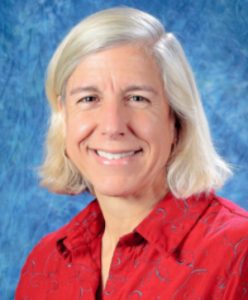
Vickie Gooch is a detective with the Idaho State Police. She has been employed in the Criminal Justice System since 1980, of which the last thirty years has been as a detective. She also teaches college and high school courses at Boise State University, the College of Western Idaho, and Bishop Kelly High School, Boise, Idaho, in Forensic Science, Criminal Justice, and Policing. She has a B.A. in Criminal Justice Administration from Boise State University (1985) and a M.P.A. from the University of Idaho, Moscow, Idaho (1994).
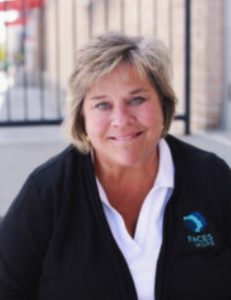 Jean M. Fisher works at the Ada County Prosecutor’s Office in Boise, Idaho as the Special Crimes Unit Chief Deputy and as the Chief Operating Officer of the Faces of Hope Victim Center which is located off-site of the prosecutor’s office. Jean is a career prosecutor. She began her career with Ada County as in intern in 1988. She graduated from the University of Idaho College of Law in May of 1989 and began working for the prosecutor’s office one month later in June of 1989.
Jean M. Fisher works at the Ada County Prosecutor’s Office in Boise, Idaho as the Special Crimes Unit Chief Deputy and as the Chief Operating Officer of the Faces of Hope Victim Center which is located off-site of the prosecutor’s office. Jean is a career prosecutor. She began her career with Ada County as in intern in 1988. She graduated from the University of Idaho College of Law in May of 1989 and began working for the prosecutor’s office one month later in June of 1989.
The bulk of Jean’s career has been dedicated to prosecuting sex offenders of children and adults, as well as well as physical abuse and neglect of children. She has also prosecuted murder, arson, and serious felony kidnapping cases. Jean has a long list of successful child abuse cases that have withstood the scrutiny of both the Idaho Court of Appeals and the Idaho Supreme Court. In addition, Jean has taught several times for the National College of District Attorneys in Columbia, South Carolina, on trial advocacy. She was also invited to speak at NCDA conferences on ethics as it relates in particular to prosecuting sex crimes.
In the fall of 2015, Jean was named Chief Operating Officer of the Faces of Hope Victim Center. As COO, Jean works at the Center collaborating and developing community partners dedicated to serving victims of child abuse, sexual assault, domestic violence and elder abuse. The Center houses 9 partners including Saint Alphonsus RMC, St. Luke’s RMC, Boise Police Department, Idaho Department of Health and Welfare, the University of Idaho College of Law, and the Faces of Hope Foundation.
Andrew Foster is a Detective Sergeant with the Teton County Sheriff’s Office. He has served as a detective for four years and previously worked as a patrol deputy. Sergeant Foster’s detective work primarily focuses on crimes of sexual assault and child abuse. Sergeant Foster has also worked on inter-agency teams investigating homicides, burglaries, financial crimes, and drug investigations. Sergeant Foster completed the Law Enforcement Program at Idaho State University after graduating from Teton High School in Driggs, Idaho. He enjoys spending time in the outdoors, hunting, fishing, and riding dirt bikes with family and friends. Sergeant Foster married his high school sweetheart, Angela, and they have two children. He is proud to live and serve in the community where he was born and raised while working to keep it a safe place for his family.
Katie White is a Forensic Biology Supervisor with the Idaho State Police Forensic Services Division and also serves as the State CODIS Administrator. Before joining ISPFS in 2016, she worked as a forensic biologist for the Denver Police Department, Texas Department of Public Safety, and as a military contractor providing forensic services overseas. In her free time, Katie enjoys spending time with her five dogs.
Colleen Fitzpatrick, PhD, the founder of Identifinders International, is widely recognized as the founder of modern Forensic Genealogy. She has worked over two hundred cold case homicides for law enforcement using genetic genealogy analysis. Most notably, she is credited with solving the 1992-1993 Phoenix Canal Murders – the first case solved using genetic genealogy (2015). Dr. Fitzpatrick and the Phoenix Police Department were awarded fifth place in the prestigious 2018 DNA Hit of the Year contest sponsored by Gordon Thomas Honeywell Affairs out of 61 submissions from 14 countries. More recently, Dr. Fitzpatrick, along with the King Co Sheriff’s Office, was awarded fifth place in the 2020 competition out of 50 submissions from 20 countries for solving the 1991 Sarah Yarborough Homicide – the first case where genetic genealogy was used to generate investigative leads (2011). Dr. Fitzpatrick is a pioneer in applying whole genome sequencing to low-level and highly degraded DNA, enabling identifications that otherwise were believed to have gone beyond the reach of modern technology. She is a member of the Vidocq Society and an Associate Member of the American Academy of Forensic Science.
Mr. Kent Burggraaf
Utah Attorney General’s Office
Mr. John Butler
NIST
Debbie Smith
Joyful Heart Foundation
2022 Rick Groff Visionary Leadership in Forensic Science Award
Rick Groff was a visionary leader at ISP Forensic Science (ISPFS) who recognized the value of accreditation and led efforts in 1987 for initial accreditation. His forward-thinking work has kept ISPFS at the forefront of forensic science throughout the nation.
 The individuals named here are honored in recognition of outstanding and visionary leadership in forensic science at Idaho State Police Forensic Services (ISPFS). This award is given to an individual for implementing a new initiative, completing a major project, innovation, or exceptional leadership that benefits the laboratory system. The awardees are visionaries within the organization who push the laboratory system to new heights. Rick Groff was a visionary leader at ISPFS in many ways. Rick recognized the value of accreditation before many in the country recognized this revolutionary change in the forensic enterprise. Therefore, he led efforts in 1987 for the initial accreditation of the laboratory system and again in 2007 for the laboratory ISO 17025 accreditation. Idaho State Police Forensic Services was one of the first laboratory systems in the country to be accredited under the ISO 17025 program. Rick also promoted the certification of the criminalists in ISPFS to ensure their competence and professionalism. After meeting the standards and passing the written examination, he was among the first individuals from ISPFS certified by the American Board of Criminalistics on December 12, 2000. Idaho State Police was the first laboratory system to require certification of all analysts and was the only laboratory system with this requirement for many years. Rick started with the lab as part of the Bureau of Laboratories in the Idaho Department of Health and Welfare. He and his boss were the only analysts when he started with the forensic section of the health lab. After about five years, he was promoted to lab manager and served in a leadership position for the rest of his 37-year career with the forensic laboratory. Rick also served as system director, assistant bureau chief, and quality manager. He played a lead role as the forensic laboratory grew from a two-person laboratory in the early 1970s to three labs, and approximately 25 people were employed in the forensic laboratories when he retired in 2006. He worked hard to obtain the resources needed for the laboratory during the transition from the Department of Health and Welfare to the Idaho State Police. Rick recognized the need for an association of forensic quality managers to educate, discuss, and interpret quality standards and help implement new standards. Rick organized a gathering of forensic quality managers in the summer of 2001 to discuss the formation of a forensic quality assurance association and was elected the first president of what came to be known as the Association of Forensic Quality Assurance Managers (AFQAM). He was also a charter member of the Northwest Association of Forensic Scientists. Rick always pushed for a vision of ISPFS as a highly respected and quality-centered laboratory system.
The individuals named here are honored in recognition of outstanding and visionary leadership in forensic science at Idaho State Police Forensic Services (ISPFS). This award is given to an individual for implementing a new initiative, completing a major project, innovation, or exceptional leadership that benefits the laboratory system. The awardees are visionaries within the organization who push the laboratory system to new heights. Rick Groff was a visionary leader at ISPFS in many ways. Rick recognized the value of accreditation before many in the country recognized this revolutionary change in the forensic enterprise. Therefore, he led efforts in 1987 for the initial accreditation of the laboratory system and again in 2007 for the laboratory ISO 17025 accreditation. Idaho State Police Forensic Services was one of the first laboratory systems in the country to be accredited under the ISO 17025 program. Rick also promoted the certification of the criminalists in ISPFS to ensure their competence and professionalism. After meeting the standards and passing the written examination, he was among the first individuals from ISPFS certified by the American Board of Criminalistics on December 12, 2000. Idaho State Police was the first laboratory system to require certification of all analysts and was the only laboratory system with this requirement for many years. Rick started with the lab as part of the Bureau of Laboratories in the Idaho Department of Health and Welfare. He and his boss were the only analysts when he started with the forensic section of the health lab. After about five years, he was promoted to lab manager and served in a leadership position for the rest of his 37-year career with the forensic laboratory. Rick also served as system director, assistant bureau chief, and quality manager. He played a lead role as the forensic laboratory grew from a two-person laboratory in the early 1970s to three labs, and approximately 25 people were employed in the forensic laboratories when he retired in 2006. He worked hard to obtain the resources needed for the laboratory during the transition from the Department of Health and Welfare to the Idaho State Police. Rick recognized the need for an association of forensic quality managers to educate, discuss, and interpret quality standards and help implement new standards. Rick organized a gathering of forensic quality managers in the summer of 2001 to discuss the formation of a forensic quality assurance association and was elected the first president of what came to be known as the Association of Forensic Quality Assurance Managers (AFQAM). He was also a charter member of the Northwest Association of Forensic Scientists. Rick always pushed for a vision of ISPFS as a highly respected and quality-centered laboratory system.
Katie started with the Idaho State Police Forensic Services in 2016 as a DNA analyst in the casework section. She came to Idaho with experience from several other labs and has utilized that experience to help her section transition to a teamwork approach to cases, which in turn allowed for a faster turnaround time.
In 2018, Katie assumed the responsibility of the CODIS State Administrator. In this position, Katie is responsible for the maintenance of Idaho’s State DNA Index System. This is a complex role, as it combines DNA with computer databases, and requires a close partnership with IT.
In 2020, she was promoted to Forensic Scientist 3, DNA Supervisor. In this position, Katie supervised half of the biology section and the entirety of the DNA Database section until a third DNA supervisor was added in 2024.
Katie serves on the Idaho Cold Case Advanced DNA Methods (ICCADM) working group and is the designated laboratory official on the Sexual Assault Kit Initiative (SAKI) group. She is the first ever designated laboratory official for the practice of Forensic Genetic Genealogy in Idaho. This is in addition to her normal duties as a forensic scientist and supervisor.
As the designated laboratory official on the SAKI group, Katie has consistently exhibited expertise on current multidisciplinary forensic testing, and retesting capabilities, and DNA evidence preservation. Without her knowledge and assistance, the SAKI group would not have been able to understand and navigate the CODIS submission, DNA hit resolution process and offer suggestions to help the group map an improved and more efficient DNA collection process. Katie’s comprehensive knowledge of DNA evidence and testing are recognized by local law enforcement agencies throughout the state and have been key selling points cited by the SAKI group when soliciting cold case investigative cooperation. Katie’s contributions to the SAKI group have been vital to the team’s past, present, and future success.
Katie has a willingness to go above and beyond her position to the betterment of her section and the entire lab system. When help is needed to help move a DNA batch through the lab, Katie will adjust her schedule to get the work done. When rush evidence is delivered after hours, Katie volunteers to stay late to begin processing so it can be completed as quickly as possible.
Katie exemplifies what a forensic scientist should be with her work ethic, drive, and her willingness to help wherever she is needed.
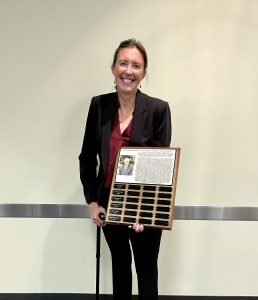 Stefani Liljenquist has been working for the Idaho State Police for over 23 years. Before her official start with ISP, she was an intern with the laboratory for an additional year. She has served the Pocatello laboratory as a forensic evidence and customer service specialist for her entire career. She took it upon herself to work toward becoming certified, and was the first one in our laboratory system to obtain her certification as a Property and Evidence Specialist by the International Association for Property and Evidence. She continued to advocate for the laboratory system to support certification for every forensic evidence specialist. Certification is now a requirement of employment at ISPFS as a forensic evidence specialist. Stefani is an exceptionally hard worker and embodies the term “team player”, as she always puts the team first. Her dedication to her work is inspiring. She approaches every task with enthusiasm and determination, and no matter how challenging it is, she never shies away from taking on extra responsibilities or helping out wherever needed. For example, she helped scan all the paper copies of the laboratory quality manuals and methods so they could be placed on the lab system website. She helps with breath alcohol instrument calibration, and uploads the certificates to our public website. She fields all the inquiries and resolves any issue with officers registering for and completing the breath testing certification registration. She is also the record keeper for the permanent retention physical case files which requires an attention to detail for the archiving of these records. Her collaborative spirit makes her an invaluable asset to any project she’s involved in, and she always brings a sense of unity and camaraderie to any group she joins. She is also incredibly punctual with an impeccable attendance record.
Stefani Liljenquist has been working for the Idaho State Police for over 23 years. Before her official start with ISP, she was an intern with the laboratory for an additional year. She has served the Pocatello laboratory as a forensic evidence and customer service specialist for her entire career. She took it upon herself to work toward becoming certified, and was the first one in our laboratory system to obtain her certification as a Property and Evidence Specialist by the International Association for Property and Evidence. She continued to advocate for the laboratory system to support certification for every forensic evidence specialist. Certification is now a requirement of employment at ISPFS as a forensic evidence specialist. Stefani is an exceptionally hard worker and embodies the term “team player”, as she always puts the team first. Her dedication to her work is inspiring. She approaches every task with enthusiasm and determination, and no matter how challenging it is, she never shies away from taking on extra responsibilities or helping out wherever needed. For example, she helped scan all the paper copies of the laboratory quality manuals and methods so they could be placed on the lab system website. She helps with breath alcohol instrument calibration, and uploads the certificates to our public website. She fields all the inquiries and resolves any issue with officers registering for and completing the breath testing certification registration. She is also the record keeper for the permanent retention physical case files which requires an attention to detail for the archiving of these records. Her collaborative spirit makes her an invaluable asset to any project she’s involved in, and she always brings a sense of unity and camaraderie to any group she joins. She is also incredibly punctual with an impeccable attendance record.
Last year, she was the only forensic evidence specialist in the Pocatello laboratory. Stefani took this in stride and continued to not only do her own job but also the work of her missing counterpart. Stefani stepped up and single-handedly filled the position, proving her worth as an invaluable member of the team. She is a true asset to our organization, consistently displaying dedication and focus when tackling any challenge thrown her way. The analysts in the Pocatello lab now help with front desk coverage, evidence intake, and answering phones when Stefani is on break or out of the lab. Stefani not only trained everyone in the lab to perform these duties, but also took it upon herself to create an evidence intake “bible” that the scientists follow religiously. This comprehensive, step-by-step guide to evidence intake provided the scientists in the lab with the clarity and confidence they needed to perform an unfamiliar task. The guide helped to minimize any uncertainty or stress associated with the process, and for that, the lab scientists are incredibly appreciative. When an unusual situation arises when taking in evidence, and the scientist needs help, Stefani never scolds or gets upset, she calmly reassures with a positive attitude. She always keeps things positive in the training process.
Stefani is not only a great worker and teacher, but she is also a great listener and sounding board. Numerous times a day, Stefani will get interrupted by one of the scientists with a dilemma. She is great at listening and giving her perspective, which is almost always a view or direction that the individual had not thought of, thus allowing the person to “see the forest for the trees”. She is always busy, and yet, still asks what she can do to help everyone else. Stefani is a true professional and perfectionist when it comes to her work. She has an incredible eye for detail and is an invaluable asset as a trainer, possessing an encyclopedic knowledge of ISP policy. Stefani organizes and teaches in-person evidence handling, packaging and submission classes to our customers. Her ability to break complex concepts down into easily digestible information is what makes her a great teacher, allowing her coworkers and students to fully understand and apply the material she presents. She is a fantastic face for the agency as she always gives full effort to provide excellent customer service. Almost every ISPFS customer service survey has a comment about how much the officers and agencies love and appreciate her. Congratulations Stefani on being the Idaho State Police Forensic Services Rick Groff Visionary Leadership in Forensic Science Awardee for 2023.
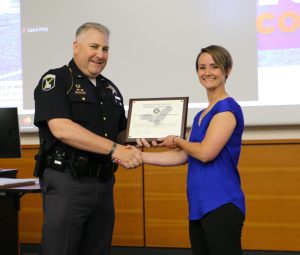 Kerry Hogan is an exceptional leader in our laboratory system. Kerry was recently promoted to Forensic Scientist 3 Supervisor after a period of time serving as a lead worker supervisor in the Meridian laboratory. She currently supervises the latent print section while performing analysis in the controlled substance unit of the Meridian laboratory. Kerry joined ISPFS approximately 14 years ago and was initially trained in forensic biology before switching to controlled substance analysis. Kerry is a very productive analyst and proactively contributes as a member of the management team. Kerry conducts herself in a way that represents the laboratory admirably. She is highly esteemed by her fellow colleagues. Kerry participates on the Board of the Northwest Association of Forensic Scientists where she advocates for forensic science training and education for her coworkers and other forensic scientists. Kerry was nominated for this award by one of the employees she supervises. The employee commented, “As my supervisor she has displayed exceptional communication skills through any constructive criticism, information sharing and general forensics knowledge. She greatly contributes to a more uplifting atmosphere within the laboratory and enhances laboratory morale, especially within the latents section. I am grateful to her for providing an atmosphere that allows me to feel safe and comfortable to approach her with any problems or needs that I have. She is the epitome of a team player within the laboratory by always being ready to dedicate her time and skills to any pressing cases or challenges that arise. She is quick to offer help, ready to expand her knowledge and learn so that she may benefit the laboratory on a greater scale. Kerry is an outstanding teammate and leader while out in the field at crime scenes as well. She has built a lasting positive rapport with law enforcement officers due to her crime scene responses and chemistry casework that greatly benefit the laboratory in multiple ways. The laboratory is better because of her influence and leadership.” Kerry recently completed the Certified Public Manager course offered by the State of Idaho. As her capstone project, she developed an onboarding process at ISPFS that has been used to onboard many employees. In addition to creating the forms and process, Kerry helped define the ISPFS onboarding culture as inclusiveness and efficiency. This onboarding process has been a huge benefit to the laboratory system and to the new hires at ISPFS. Kerry has gone out of her way to help with the fitness program at ISP and ISPFS to ensure that exercise is a part of the offerings available to ISPFS employees. The health and wellness of ISPFS employees is of great importance to Kerry. Kerry is an incredible scientist and leader at ISPFS, and it is a great privilege for all of us to work with her.
Kerry Hogan is an exceptional leader in our laboratory system. Kerry was recently promoted to Forensic Scientist 3 Supervisor after a period of time serving as a lead worker supervisor in the Meridian laboratory. She currently supervises the latent print section while performing analysis in the controlled substance unit of the Meridian laboratory. Kerry joined ISPFS approximately 14 years ago and was initially trained in forensic biology before switching to controlled substance analysis. Kerry is a very productive analyst and proactively contributes as a member of the management team. Kerry conducts herself in a way that represents the laboratory admirably. She is highly esteemed by her fellow colleagues. Kerry participates on the Board of the Northwest Association of Forensic Scientists where she advocates for forensic science training and education for her coworkers and other forensic scientists. Kerry was nominated for this award by one of the employees she supervises. The employee commented, “As my supervisor she has displayed exceptional communication skills through any constructive criticism, information sharing and general forensics knowledge. She greatly contributes to a more uplifting atmosphere within the laboratory and enhances laboratory morale, especially within the latents section. I am grateful to her for providing an atmosphere that allows me to feel safe and comfortable to approach her with any problems or needs that I have. She is the epitome of a team player within the laboratory by always being ready to dedicate her time and skills to any pressing cases or challenges that arise. She is quick to offer help, ready to expand her knowledge and learn so that she may benefit the laboratory on a greater scale. Kerry is an outstanding teammate and leader while out in the field at crime scenes as well. She has built a lasting positive rapport with law enforcement officers due to her crime scene responses and chemistry casework that greatly benefit the laboratory in multiple ways. The laboratory is better because of her influence and leadership.” Kerry recently completed the Certified Public Manager course offered by the State of Idaho. As her capstone project, she developed an onboarding process at ISPFS that has been used to onboard many employees. In addition to creating the forms and process, Kerry helped define the ISPFS onboarding culture as inclusiveness and efficiency. This onboarding process has been a huge benefit to the laboratory system and to the new hires at ISPFS. Kerry has gone out of her way to help with the fitness program at ISP and ISPFS to ensure that exercise is a part of the offerings available to ISPFS employees. The health and wellness of ISPFS employees is of great importance to Kerry. Kerry is an incredible scientist and leader at ISPFS, and it is a great privilege for all of us to work with her.
 Rylene is one of the most tenured scientists with Idaho State Police Forensic Services. She started her career in the DNA section and was promoted several years ago to the position of Meridian Laboratory Manager. Rylene has always been an incredibly productive and organized analyst and demonstrates those same qualities as the lab manager. Rylene is crucial to the success of the Meridian lab as the lab manager and the entire lab system with her gracious and inspiring leadership. She supports all staff in pursuing their personal and professional ambitions, encouraging them to consider leadership training. She helps people see their potential and encourages them to become more involved within the system. She is an excellent communicator and ensures that those above her and under her leadership are updated on the needed information. Rylene is selfless in all she does. She maintains DNA proficiency to help the biology/DNA section when needed on top of her daily manager duties. Rylene was appointed by the Lab System Director to be the project leader for the new ISPFS molecular genealogy program. She has been integral in researching and helping start the genealogy program and facilitates regular meetings for this project to ensure that Idaho cold cases are being resolved. She was also appointed by the lab system director to be the forensics representative for the ISP Choice committee, and she continuously seeks input from the supervisors and managers to represent our interests in those meetings best. Last year, Rylene asked to be able to help update all the DHR position descriptions for Forensic Services. She worked with the Lab System Director and HR staff to ensure the documents were accurate, up-to-date, and concise. This project was critical for ISPFS as many staff members were being hired, and leadership positions in the organization were being filled. Her attention to detail and subject matter expertise is respected and appreciated. Rylene also maintains crucial relationships with the agencies we serve through follow-up surveys and participating in many meetings with agencies (including our own) regarding crime scene response and any situation that needs attention. Rylene is an amazing representative of our lab system and is incredibly supportive of all the staff. She has trained many new supervisors and leaders in the Meridian Laboratory and works with each one to ensure that they have the skills necessary to navigate difficult personnel challenges. One of her staff members commented, “When I first began my career with ISP, she was an incredible mentor and I learned countless and invaluable lessons from her, which I’m sure is the story for many of our analysts. She has always represented herself in a very true and realistic nature and is something I value and appreciate in her. She is always forthcoming with information and successfully navigates any change that comes to the Meridian Lab, the lab system, or just analyst practice.” Rylene is incredibly inspiring as a leader and it is a great privilege for all of us to work with her. Congratulations Rylene on being the Idaho State Police Forensic Services Rick Groff Visionary Leadership in Forensic Science Awardee.
Rylene is one of the most tenured scientists with Idaho State Police Forensic Services. She started her career in the DNA section and was promoted several years ago to the position of Meridian Laboratory Manager. Rylene has always been an incredibly productive and organized analyst and demonstrates those same qualities as the lab manager. Rylene is crucial to the success of the Meridian lab as the lab manager and the entire lab system with her gracious and inspiring leadership. She supports all staff in pursuing their personal and professional ambitions, encouraging them to consider leadership training. She helps people see their potential and encourages them to become more involved within the system. She is an excellent communicator and ensures that those above her and under her leadership are updated on the needed information. Rylene is selfless in all she does. She maintains DNA proficiency to help the biology/DNA section when needed on top of her daily manager duties. Rylene was appointed by the Lab System Director to be the project leader for the new ISPFS molecular genealogy program. She has been integral in researching and helping start the genealogy program and facilitates regular meetings for this project to ensure that Idaho cold cases are being resolved. She was also appointed by the lab system director to be the forensics representative for the ISP Choice committee, and she continuously seeks input from the supervisors and managers to represent our interests in those meetings best. Last year, Rylene asked to be able to help update all the DHR position descriptions for Forensic Services. She worked with the Lab System Director and HR staff to ensure the documents were accurate, up-to-date, and concise. This project was critical for ISPFS as many staff members were being hired, and leadership positions in the organization were being filled. Her attention to detail and subject matter expertise is respected and appreciated. Rylene also maintains crucial relationships with the agencies we serve through follow-up surveys and participating in many meetings with agencies (including our own) regarding crime scene response and any situation that needs attention. Rylene is an amazing representative of our lab system and is incredibly supportive of all the staff. She has trained many new supervisors and leaders in the Meridian Laboratory and works with each one to ensure that they have the skills necessary to navigate difficult personnel challenges. One of her staff members commented, “When I first began my career with ISP, she was an incredible mentor and I learned countless and invaluable lessons from her, which I’m sure is the story for many of our analysts. She has always represented herself in a very true and realistic nature and is something I value and appreciate in her. She is always forthcoming with information and successfully navigates any change that comes to the Meridian Lab, the lab system, or just analyst practice.” Rylene is incredibly inspiring as a leader and it is a great privilege for all of us to work with her. Congratulations Rylene on being the Idaho State Police Forensic Services Rick Groff Visionary Leadership in Forensic Science Awardee.

Britany has contributed to Idaho State Police Forensic Services by excelling as a scientist and moving forward a number of important initiatives. Britany has performed and assisted in the toxicology section with validations, trained new analysts, and was instrumental in getting the Pocatello lab set up with the new equipment and instrument methods. Britany has been a major contributor in getting the National Integrated Ballistic Information Network (NIBIN) entry by ISPFS back online for Idaho. This has been a significant development for Idaho, and new terminals are being added to Idaho soon to further accelerate this program. When the lab system moved our electronic documents to the Qualtrax system, Britany provided assistance to every lab and almost every discipline in getting the methods formatted for entry into Qualtrax. This was not as simple of a task as we had initially predicted. She is always willing to take on extra tasks that fall outside the normal scope of her job. Sometimes people may get the impression that Britany is selected and given certain tasks, but the reality of it is when there is a new system, she takes the initiative to learn about it and she steps up to provide support in any way she can. Britany does not expect to get anything in return. She does these things to make forensic science stronger in Idaho. Britany has devoted hundreds of hours to supporting the Idaho Information Management System (ILIMS) system. She is constantly troubleshooting, improving, and testing the system. As an example of how she works, Britany took a crystal reports class on her own time and at her own expense, to develop skills that would be helpful. She has supported every lab when new computers or updates are deployed to resolve issues that come up. Britany consistently excels and goes above-and-beyond our expectations. Congratulations Britany for being the 2020 Rick Groff Award winner.
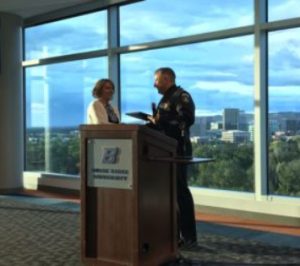
Corinna not only supervises 4 chemists in her own laboratory but has also assisted the chemistry Technical Leader with almost every major project for our section. She also assists the Quality Manager with her duties as the deputy quality manager and often fills in for the lab manager when she is away. Outside of her outstanding work and work ethic for ISPFS, she served six years on the NWAFS board and is currently serving on the CLIC board, an international association. Corinna has always done anything in her power to keep the lab system running, looking to the future, and effective. She is one of our top case producers, testifies for us in front of the legislature, is a fantastic trainer, and has trained many of our current staff. Corinna is the best leader I have had the pleasure of knowing.
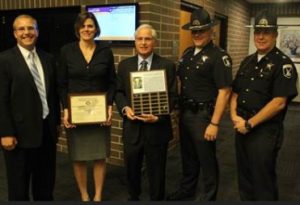
Anne’s contributions toward vision at ISPFS was her work on developing the new toxicology methods at ISPFS and enormous improvements in the number and types of drugs that can be analyzed and confirmed while also adding quantitative toxicology. Not only did she oversee the development of this method in CDA, but she helped to get it implemented in the Pocatello lab and train the three analysts there to use the method. Anne has taken at least two courses in process mapping and lean six sigma and has facilitated several of these exercises, including currently working with the DNA section on implementation of a lean six sigma efficiency project. In addition to her duties as a lab manager, she also has worked a full-time case analyst workload over the last several years due to illness or injury to her staff members. She makes time on the ILIMS team and has worked on projects such as appropriate case allocation for the lab system, assigning lab system employees to professional organizations, and figuring the lab system instrument replacement schedule.

